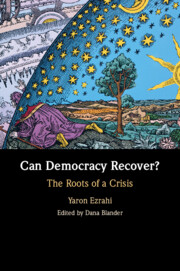Book contents
- Can Democracy Recover?
- Can Democracy Recover?
- Copyright page
- Dedication
- Contents
- Preface
- Words from the Author
- Introduction
- Part I The Rise of Western Politics following the Collapse of the Monistic Medieval Cosmology
- Part II The Emergence of the Epistemological Constitution of Modern Democracy
- 4 The Imaginary of the Modern Democratic Individual as a Political Agency
- 5 Democratic Political Causality
- 6 Public Facts as Political Currency
- 7 The Visibility and Accountability of Political Power
- 8 Objectivity as a Fictional Limit of the Political
- Part III The Dialectics of Objectification
- Part IV The Erosion of the Epistemological Constitution of Modern Democracy
- Part V Democracy beyond Modernity
- Can Democracy Recover? Concluding Reflections
- Epilogue
- Index
4 - The Imaginary of the Modern Democratic Individual as a Political Agency
from Part II - The Emergence of the Epistemological Constitution of Modern Democracy
Published online by Cambridge University Press: 02 January 2025
- Can Democracy Recover?
- Can Democracy Recover?
- Copyright page
- Dedication
- Contents
- Preface
- Words from the Author
- Introduction
- Part I The Rise of Western Politics following the Collapse of the Monistic Medieval Cosmology
- Part II The Emergence of the Epistemological Constitution of Modern Democracy
- 4 The Imaginary of the Modern Democratic Individual as a Political Agency
- 5 Democratic Political Causality
- 6 Public Facts as Political Currency
- 7 The Visibility and Accountability of Political Power
- 8 Objectivity as a Fictional Limit of the Political
- Part III The Dialectics of Objectification
- Part IV The Erosion of the Epistemological Constitution of Modern Democracy
- Part V Democracy beyond Modernity
- Can Democracy Recover? Concluding Reflections
- Epilogue
- Index
Summary
The chapter explores the concept of the individual as a democratic citizen who voluntarily exercises rights and authority, and can both legitimize and delegitimize the government. It suggests that Western secular cosmological dualism, which separates the world from man, has led to the development of the modern individual, capable of introspection, autonomy, and agency. This dualism creates a divide between the physical human body and the autonomous human mind and spirit. It has facilitated the simultaneous growth of natural sciences and humanities. The chapter examines how this secular imaginary, based on the separation of Nature and man since the seventeenth and eighteenth centuries, is reflected in the philosophical discourses of influential thinkers like Hobbes, Descartes, Locke, Rousseau, Hume, and Kant. They explored the potential of this separation to evolve human agency in politics and to derive universal rights from Nature to safeguard individual freedom in society and politics. This dual cosmology also led to the development of social sciences and varying views on voluntarism and natural determinism, as seen in Freud’s psychoanalytic theory. Finally, it shows how Nature has become a cultural resource through art.
Keywords
- Type
- Chapter
- Information
- Can Democracy Recover?The Roots of a Crisis, pp. 41 - 56Publisher: Cambridge University PressPrint publication year: 2025

